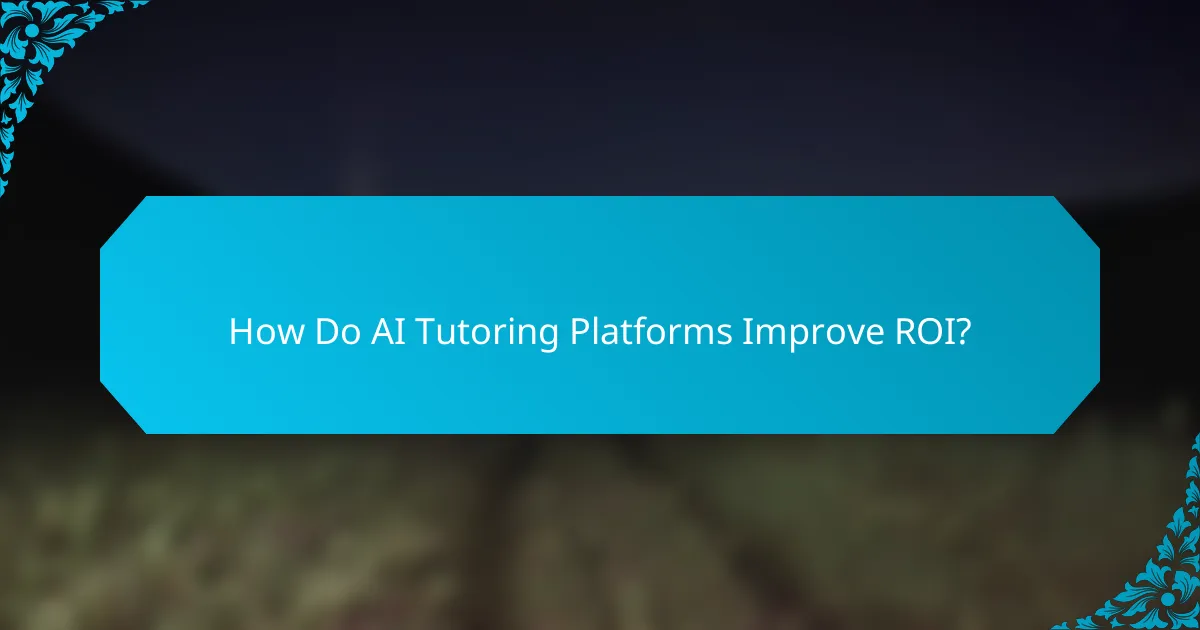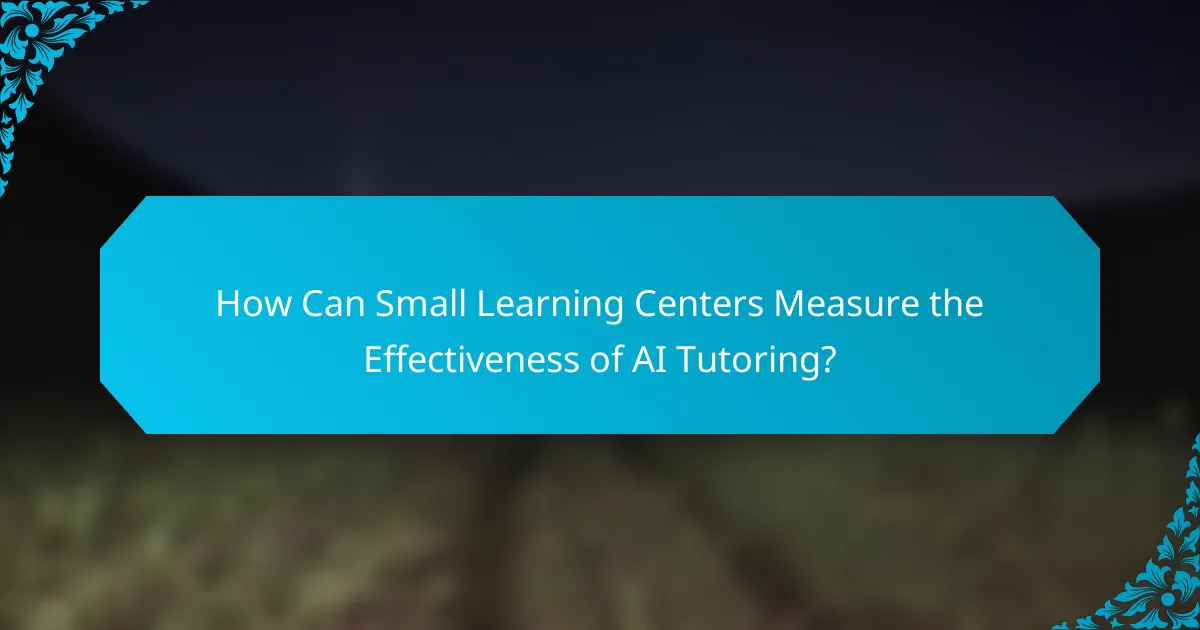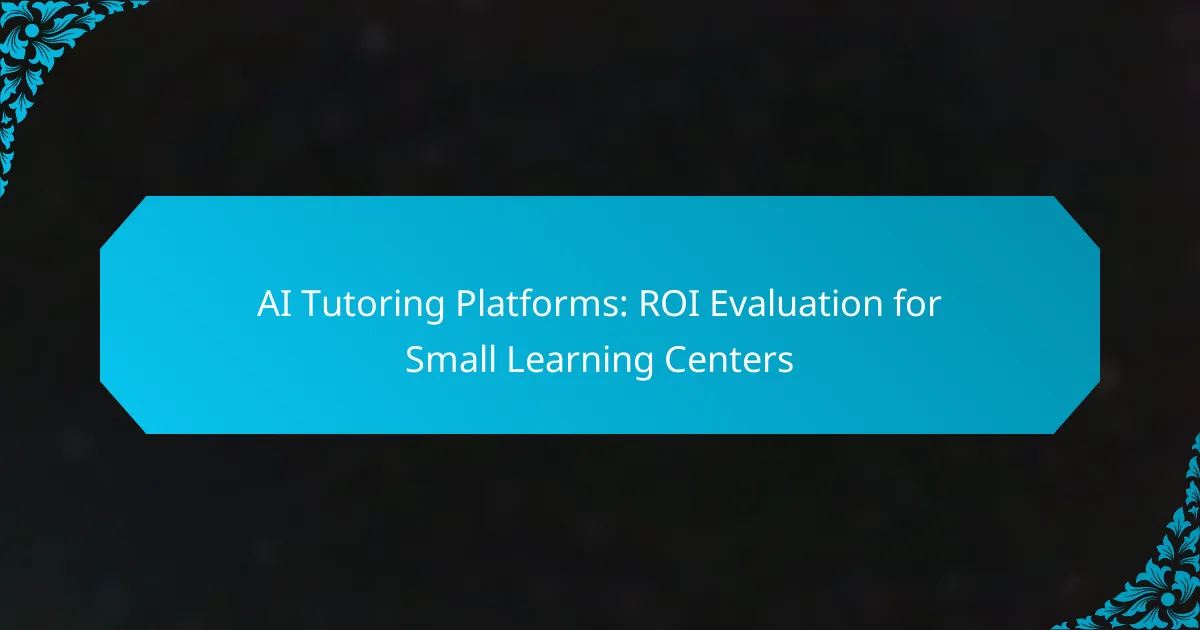AI tutoring platforms present a valuable opportunity for small learning centers to enhance educational delivery and student engagement. By optimizing costs and personalizing learning experiences, these platforms can significantly improve return on investment (ROI) while providing scalable solutions tailored to diverse educational needs.

What Are the Best AI Tutoring Platforms for Small Learning Centers?
Small learning centers can benefit from several AI tutoring platforms that enhance educational delivery and student engagement. The best options typically offer personalized learning experiences, flexible pricing, and a variety of subject coverage.
Khan Academy
Khan Academy is a free online resource that provides a wide range of subjects, including math, science, and humanities. It utilizes adaptive learning technology to tailor lessons to individual student needs, making it an excellent choice for small learning centers looking to supplement their curriculum.
Consider integrating Khan Academy into your tutoring sessions to offer students additional practice and resources. Its user-friendly interface and extensive library can help students learn at their own pace, which is crucial for effective tutoring.
Wyzant
Wyzant connects students with qualified tutors for personalized, one-on-one sessions. Small learning centers can leverage this platform to find tutors who specialize in specific subjects or skills, ensuring that students receive targeted assistance.
When using Wyzant, evaluate tutor profiles carefully, focusing on their qualifications and reviews. This can help you select the best match for your students’ needs, enhancing the overall learning experience.
Chegg Tutors
Chegg Tutors offers on-demand tutoring services, allowing students to connect with tutors for immediate help. This platform is particularly useful for small learning centers that require flexible scheduling and a wide range of subject expertise.
Consider using Chegg’s subscription model, which can provide cost-effective access to multiple tutors. This flexibility can accommodate varying student needs and schedules, making it a practical choice for busy learning centers.
Brainly
Brainly is a collaborative learning platform where students can ask questions and receive answers from peers and experts. This community-driven approach can be beneficial for small learning centers aiming to foster collaborative learning among students.
Encourage students to engage with Brainly for homework help and peer support. However, monitor the quality of answers to ensure that students are receiving accurate information, as the platform relies on user contributions.
Smart Sparrow
Smart Sparrow focuses on adaptive elearning technologies that allow educators to create customized learning experiences. For small learning centers, this platform can be a powerful tool to develop tailored lessons that meet the specific needs of students.
Utilize Smart Sparrow’s analytics to track student progress and adjust instructional strategies accordingly. This data-driven approach can enhance learning outcomes and ensure that students are effectively mastering the material.

How Do AI Tutoring Platforms Improve ROI?
AI tutoring platforms enhance return on investment (ROI) for small learning centers by optimizing costs, boosting student engagement, and providing scalable solutions. These technologies streamline operations and personalize learning, making them valuable assets for educational institutions.
Cost Reduction
AI tutoring platforms can significantly lower operational costs by automating administrative tasks and reducing the need for extensive teaching staff. For example, centers can save on salaries by using AI to handle routine queries and assessments, allowing educators to focus on more complex teaching tasks.
Additionally, the use of AI can minimize resource expenditures, such as materials and classroom space. By offering online tutoring options, centers can reach more students without the overhead of physical facilities, leading to potential savings in the low thousands of USD annually.
Increased Student Engagement
AI tutoring platforms enhance student engagement through personalized learning experiences tailored to individual needs. By analyzing student performance, these systems can adapt content and pacing, keeping learners motivated and invested in their education.
Interactive features, such as gamification and instant feedback, further promote active participation. Centers using AI tools often report improved retention rates and higher satisfaction scores, which can translate into increased enrollment and revenue over time.
Scalable Learning Solutions
AI tutoring platforms offer scalable learning solutions that can easily adapt to varying student numbers and needs. This flexibility allows small learning centers to expand their offerings without a proportional increase in costs, making it easier to accommodate growth.
For instance, a center can implement AI-driven courses that serve hundreds of students simultaneously, providing consistent quality and support. This scalability not only enhances ROI but also positions centers to compete effectively in a rapidly evolving educational landscape.

What Factors Should Small Learning Centers Consider When Choosing an AI Tutoring Platform?
Small learning centers should evaluate several key factors when selecting an AI tutoring platform, including integration capabilities, customization options, and available support and training. These elements can significantly impact the effectiveness and usability of the platform in enhancing student learning outcomes.
Integration with Existing Systems
When choosing an AI tutoring platform, consider how well it integrates with your current systems, such as student information systems or learning management systems. A seamless integration can streamline operations, reduce administrative burdens, and enhance the overall user experience for both educators and students.
Look for platforms that offer APIs or built-in connectors to popular software solutions. This can save time and resources, allowing your center to focus on delivering quality education rather than managing disparate systems.
Customization Options
Customization is crucial for tailoring the AI tutoring platform to meet the specific needs of your learning center. Evaluate whether the platform allows you to modify content, adjust learning paths, or personalize user interfaces to align with your educational goals.
Platforms that offer robust customization features enable you to create a unique learning experience that resonates with your students. This can include adapting lessons to different learning styles or incorporating local curriculum standards, which can enhance engagement and effectiveness.
Support and Training
Effective support and training are vital for maximizing the benefits of an AI tutoring platform. Assess the level of customer support provided, including availability of technical assistance, training resources, and ongoing updates. A responsive support team can help resolve issues quickly and ensure smooth operation.
Consider platforms that offer comprehensive training programs for staff and educators. This can include webinars, tutorials, and documentation that empower your team to utilize the platform effectively, ultimately leading to better student outcomes.

What Are the Costs Associated with AI Tutoring Platforms?
The costs associated with AI tutoring platforms can vary significantly based on the features offered, the scale of implementation, and the specific needs of a learning center. Understanding these costs is crucial for evaluating the return on investment (ROI) for small learning centers.
Subscription Fees
Subscription fees are typically the most visible cost when adopting an AI tutoring platform. These fees can range from monthly payments of around $20 to several hundred dollars, depending on the platform’s capabilities and the number of users. Some platforms offer tiered pricing based on features, so it’s essential to assess which plan aligns best with your center’s needs.
When evaluating subscription costs, consider the potential for bulk discounts or annual payment options that may reduce overall expenses. Additionally, some platforms may offer free trials, allowing centers to test the service before committing financially.
Implementation Costs
Implementation costs include expenses related to integrating the AI tutoring platform into existing systems and processes. This can involve initial setup fees, which may range from a few hundred to several thousand dollars, depending on the complexity of the integration. It’s important to budget for potential technical support or custom development if your center requires specialized features.
To minimize implementation costs, ensure that your team is well-prepared and that the platform you choose has a user-friendly interface. Conducting thorough research on available platforms can help identify those that offer smoother integration processes.
Training Expenses
Training expenses are often overlooked but are essential for maximizing the effectiveness of an AI tutoring platform. These costs can include workshops, online courses, or one-on-one training sessions for staff, which may range from a few hundred to several thousand dollars. Investing in proper training ensures that your team can effectively utilize the platform and enhance the learning experience for students.
Consider leveraging free resources or training materials provided by the platform to reduce costs. Additionally, fostering a culture of continuous learning within your center can help staff stay updated on best practices and new features, ultimately improving ROI.

How Can Small Learning Centers Measure the Effectiveness of AI Tutoring?
Small learning centers can measure the effectiveness of AI tutoring by analyzing various performance metrics and student outcomes. Key indicators include improvements in grades, engagement levels, and retention rates, which provide insights into the AI system’s impact on learning.
Student Performance Metrics
Student performance metrics are essential for evaluating the effectiveness of AI tutoring. These metrics typically include test scores, assignment completion rates, and overall academic progress. By tracking these indicators before and after implementing AI tutoring, centers can gauge improvements and identify areas needing attention.
For example, a learning center might observe that students using AI tutoring tools see a 15-25% increase in math test scores over a semester. Additionally, monitoring engagement metrics, such as time spent on tasks and participation in interactive sessions, can reveal how well students connect with the AI system.
To effectively measure these metrics, centers should establish a baseline before introducing AI tutoring and regularly assess progress. Utilizing tools like learning management systems (LMS) can streamline data collection and analysis, ensuring that insights are actionable and timely.
